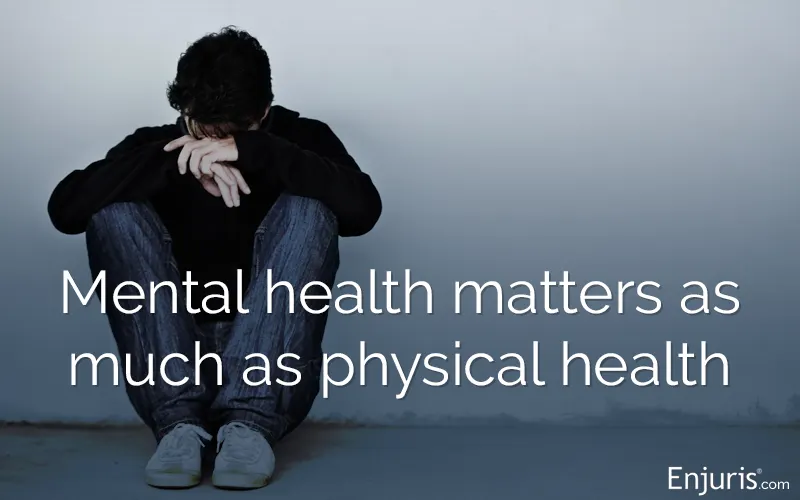
Colorado law recognizes that mental or emotional distress from an accident can have a profound impact on your life.
A serious accident can leave you with more than physical pain—it affects everything, including our emotions. And that matters in a Colorado court of law. You can file a lawsuit that includes the “invisible” costs of the mental health effects from a personal injury accident.
Colorado lawmakers understand that personal injury is more than just physical harm to your body—your mind and emotional state matters, too. Psychological injuries, often referred to as "emotional distress" or "mental anguish", can arise from a variety of circumstances, including accidents, workplace incidents, or other traumatic events. They can have a profound impact on your life, and if they’re caused by someone’s negligence, you might be able to receive compensation.
How psychological injuries work with personal injury law
"Psychological injury" in the context of personal injury law refers to mental or emotional harm suffered by an individual. This can include conditions such as anxiety, depression, post-traumatic stress disorder (PTSD), and other forms of emotional distress. Unlike physical injuries, psychological injuries are not always immediately apparent, making them more challenging to diagnose and prove in a legal context.
Colorado law recognizes the legitimacy of psychological injuries. The law requires proof of the psychological injury, often through medical diagnoses, therapy records, and expert testimony.
The plaintiff must demonstrate that the emotional distress is significant and directly linked to the defendant's negligent or intentional actions.
What is PTSD?
Post-traumatic Stress Disorder (PTSD) is defined by the National Institute of Mental Health as "a disorder that develops in some people who have experienced a shocking, scary, or dangerous event."
People who experience trauma will have a wide range of reactions, but most will eventually recover from emotional symptoms. Other people will continue to experience emotional trauma, including feeling stressed or afraid even when they’re not in danger, which could lead to a diagnosis of PTSD.
PTSD can begin immediately or within a few months following a traumatic event, or it could surface many years later. In order to be diagnosed with PTSD, symptoms must:
- Last longer than one month, and
- Interfere with relationships or work.
Some people experience short-term PTSD and others have a chronic condition.
An adult must have all of the following symptoms lasting for at least 1 month in order to have a PTSD diagnosis:
Re-experiencing symptoms
- Flashbacks
- Bad dreams
- Frightening thoughts
Avoidance symptoms
- Staying away from places, events, or objects that serve as reminders of the original trauma
- Avoiding thoughts or feelings related to the traumatic event
Arousal and reactivity symptoms
- Being easily startled
- Tension, or feeling edgy
- Sleep disturbances
- Angry outbursts
Cognition and mood symptoms
- Trouble remembering the details of the trauma
- Negative thoughts
- Distortion of guilt or blame
- Loss of interest in activities you’d normally enjoy
PTSD symptoms in children and teens
Very young children:
- Bedwetting
- Forgetting how to talk
- Acting out scary events while playing
- Being unusually clingy to well-known adults
Teens and older children:
- Disruptive, destructive, or disrespectful behavior
- Guilt (for not preventing the traumatic event)
- Revenge thoughts or fantasies
Mental anguish and emotional distress
Mental anguish and emotional distress conditions don’t have a list of specific symptoms like PTSD, but they’re still mental conditions for which you can recover damages based on the psychological impact of your injury.
There’s no specific definition for emotional distress, but symptoms could include (but aren’t limited to):
- Sleep disturbance
- Anxiety or fear
- Depression
- Humiliation
- Grief
Proving a mental health claim in a personal injury lawsuit
Because a mental health condition might not be immediately visible like a broken bone or other physical condition, proving its existence could be more difficult in a court of law—but it’s not impossible.
Typically, proving a psychological injury requires the testimony of an expert witness. This can be fraught, though, because you might have a plaintiff’s witness testifying to the evidence of a mental injury and a defendant’s witness testifying that they don’t think it’s there... but then it becomes a matter for a judge or jury to decide.
Expert witnesses
The expert witness might testify about what the mental health condition entails, what caused it in your specific case, and how they diagnosed it. They might also give an opinion about whether your symptoms are the result of the accident and meet certain criteria for diagnosis.
Experts will also rely on medical records. If you suspect that you’re experiencing emotional difficulties as a result of an accident, it’s crucial to seek a professional opinion. Make an appointment with a psychiatrist, psychologist, counselor, or even your primary care provider. They will evaluate your condition and make a diagnosis or referral.
Victim testimony and documents
You can also keep a journal that details your mental state on your own. Making notes each day about the emotional and physical effects of your mental condition can help bolster your case. You can include information about your mood, how you slept that night, how you ate, and other aspects of your life that might be affected.
Remember this: You can testify that your anxiety gave you headaches over a period of three months after the accident. While that is important and valid, it likely becomes more convincing if you have a journal that lists the dates and times when you experienced anxiety-related headaches over that three-month period.

Sample accident journal/diary to help you document the effect on your daily life
Download in PDF format
Friends, family, and coworkers
There’s no one better to testify about changes in your demeanor and behavior than the people who know you best. The court might subpoena your friends, coworkers, or family who have observed your behavior and personality before and after the accident so they can testify about any changes they’ve seen during the relevant period of time.
Damage caps on non-economic claims in Colorado
Non-economic damages include things like pain and suffering or mental distress. Things like medical visits and days off from work have a specific dollar amount or value, and those are economic damages. Less-specific—though equally important—losses that don’t have a monetary value are called non-economic damages.
Colorado law caps non-economic damages at $250,000 for most personal injury claims. However, it’s possible for a victim to receive up to $500,000 if there is "clear and convincing evidence."
There is no cap on medical costs or lost wages, and there is also no cap on cases that involve physical impairment (for example, loss of a limb).
It’s also important to note that in a Colorado workers’ compensation claim, pain and suffering does not qualify as compensatory damages.
What to do if you’ve suffered psychological injuries in a Colorado accident
First, are you safe?
If you suffer from suicidal ideations or have considered self-harm, please call the Suicide and Crisis Lifeline at 988.
If you’re not experiencing an immediate crisis, you should still seek professional help. Your primary care provider or insurance company can refer you to a licensed clinician who can offer mental health diagnosis, counseling and treatment.
If you believe that your mental health struggles are the result of an accident or because of someone’s negligence, you can contact a Colorado personal injury lawyer for assistance in determining whether you can file a lawsuit. Likewise, if you already have a lawsuit pending for the accident, ask your lawyer whether you can add your mental health concerns for additional compensation.
See our guide Choosing a personal injury attorney.

